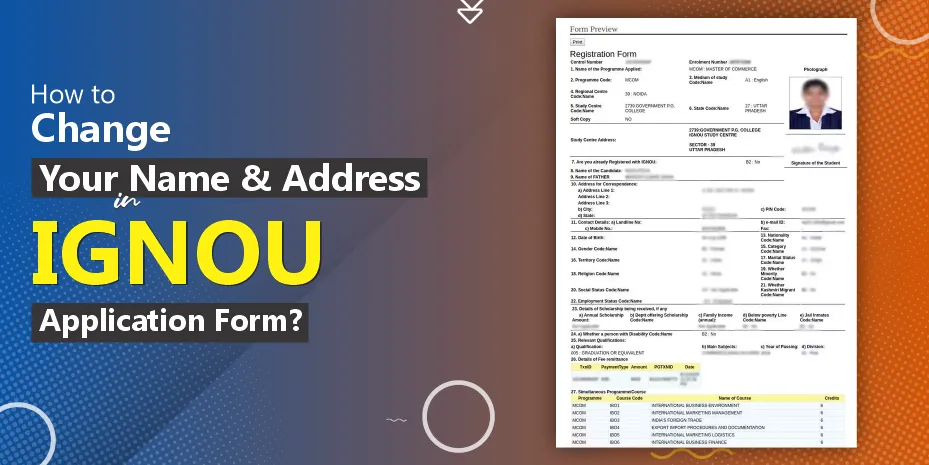IGNOU (Indira Gandhi National Open University) has been an important educational institute in India for decades, offering a wide range of courses to students all over the world.
However, many students who graduate from IGNOU often wonder whether their degrees are valid in Europe, due to the varying education systems and regulations across the continent. In this blog post, we will provide you with a comprehensive guide on the validity of IGNOU degrees in Europe. We will explore the accreditation process, the recognition of IGNOU degrees, and the steps you can take to ensure that your IGNOU degree is accepted in Europe. So, if you’re considering applying to IGNOU or have already graduated and are planning to move to Europe, this post is for you.
Contents
- 1 1. Why IGNOU degrees are popular in Europe
- 1.1 2. Assessing the validity of IGNOU degrees in Europe
- 1.2 3.What makes IGNOU degrees unique
- 1.3 4. Accreditation of IGNOU by the Indian government
- 1.4 5. Recognition of IGNOU by international organisations
- 1.5 6. Understanding the European Higher Education Area (EHEA)
- 1.6 7. How IGNOU degrees comply with EHEA standards
- 1.7 8.Pros and cons of pursuing an IGNOU degree in Europe
1. Why IGNOU degrees are popular in Europe
IGNOU degrees are becoming increasingly popular in Europe due to several reasons. Firstly, IGNOU offers a wide range of courses across various disciplines, making it a one-stop-shop for students looking to further their education. Secondly, the flexibility provided by IGNOU is a major attraction for students. With distance learning programs and online courses, students can complete their degrees while juggling other commitments such as work or family. This flexibility makes it easier for students to pursue higher education without having to give up on other responsibilities.
Another reason for the popularity of IGNOU degrees is the affordability factor. Compared to universities in Europe, IGNOU offers courses at a much lower cost, making it an attractive option for students who want to avoid the high costs associated with higher education in Europe. Finally, IGNOU has a reputation for providing quality education and is recognized by various organisations and institutions across the world. This recognition adds to the credibility of IGNOU degrees and makes them a viable option for students looking to further their education in Europe.
2. Assessing the validity of IGNOU degrees in Europe
If you’re looking to pursue higher education at IGNOU and then move to Europe, you need to consider the validity of IGNOU degrees in Europe. It’s important to note that the recognition of IGNOU degrees in Europe can vary depending on the country, institution, and course.
In most cases, IGNOU degrees are recognized in Europe, but you need to check the recognition status of the degree in the country you plan to work or study in. You can check the recognition status of IGNOU degrees in Europe by visiting the official websites of the higher education regulatory authorities in Europe.
Additionally, you should also check if the specific program you’re interested in pursuing at IGNOU is recognized in Europe. For instance, some courses may not be recognized in certain countries or institutions, while others are widely accepted.
It’s also important to note that some countries have specific requirements for recognizing foreign degrees. For example, countries like Germany and France may require additional documentation or exams before recognizing an IGNOU degree.
3.What makes IGNOU degrees unique
One of the unique aspects of IGNOU degrees is that they are designed to be accessible to a wide range of students, regardless of their backgrounds or circumstances. IGNOU stands for Indira Gandhi National Open University, and as the name suggests, it is an open university that offers distance learning programs. This means that students can take courses and earn degrees from anywhere in the world, without having to attend physical classes on a regular basis.
Another unique feature of IGNOU degrees is their flexibility. Students can choose to study full-time or part-time, and can also choose the pace at which they progress through their courses. This is particularly beneficial for students who are working or have other commitments that make it difficult to attend traditional university courses.
IGNOU degrees are also recognized by the University Grants Commission (UGC), which is the regulatory body for higher education in India. This means that the degrees are widely accepted and respected within India, and many employers in India recognize the value of an IGNOU degree.
4. Accreditation of IGNOU by the Indian government
One of the key factors in determining the validity of an IGNOU degree in Europe is the accreditation of the university by the Indian government. IGNOU (Indira Gandhi National Open University) is a government-owned university that was established in 1985. It is recognized by the University Grants Commission (UGC) of India and is also a member of the Association of Indian Universities (AIU).
The accreditation of IGNOU by the Indian government provides assurance of the quality of education provided by the university. It also ensures that the degree programs offered by the university are recognized by other universities and institutions in India.
However, it is important to note that accreditation by the Indian government does not automatically guarantee recognition of IGNOU degrees in other countries. Each country has its own set of accreditation and recognition policies, and it is important to understand these policies before pursuing an IGNOU degree.
Therefore, it is recommended that students who are considering pursuing an IGNOU degree in Europe should research the accreditation and recognition policies of the specific country they are interested in. This will ensure that they have a clear understanding of how their degree will be perceived in that country, and whether they will be able to use their degree to pursue further education or employment opportunities.
5. Recognition of IGNOU by international organisations
When it comes to the recognition of IGNOU degrees, it’s important to consider how they are viewed by international organisations. IGNOU has been recognized by a number of international organisations, including the Commonwealth of Learning, the International Council for Open and Distance Education (ICDE), and the Association of Indian Universities (AIU).
The Commonwealth of Learning is an intergovernmental organisation that promotes education and training through open and distance learning, and IGNOU is one of its member institutions. The ICDE is a global organisation that promotes open and distance education, and IGNOU is one of its institutional members. The AIU is a regulatory body that sets standards for higher education institutions in India, and it has recognized IGNOU as a central university.
However, it’s important to note that recognition by international organisations does not necessarily mean that IGNOU degrees will be recognized in every country or by every employer. Each country and employer has its own requirements and standards for recognizing degrees and qualifications, and it’s important to research these requirements before pursuing an IGNOU degree if you plan to work or study abroad.
6. Understanding the European Higher Education Area (EHEA)
The European Higher Education Area (EHEA) is a network of countries working together to create a more transparent and coherent higher education system across Europe. The EHEA was established in 2010 with the goal of making it easier for students to move between different countries and institutions to pursue their education.
One of the most important things to understand about the EHEA is the Bologna Process, which is a series of agreements and guidelines that have been developed to standardise higher education across Europe. The Bologna Process has been adopted by 48 countries, including all of the members of the European Union, and it sets out clear guidelines for the structure of higher education degrees and the recognition of qualifications.
It’s important to note that while the Bologna Process has helped to create a more standardised system of higher education across Europe, each country still has its own unique system and regulations. Therefore, it’s important to research the specific rules and regulations for the country where you are hoping to use your IGNOU degree. This can help you understand the validity of your degree and whether it will be recognized by employers or educational institutions in that country. By understanding the EHEA and the Bologna Process, you can navigate the validity of your IGNOU degree in Europe more effectively.
7. How IGNOU degrees comply with EHEA standards
It is important to understand how IGNOU degrees comply with the standards of the European Higher Education Area (EHEA). The EHEA is a network of 48 countries that cooperate to promote the mobility of students and staff, improve the quality and competitiveness of European higher education, and support the development of the European Research Area.
IGNOU is recognized by the University Grants Commission (UGC) and the Ministry of Education, Government of India. The UGC is responsible for maintaining the standards of higher education in India and recognizes the degrees awarded by IGNOU.
In addition, IGNOU is a member of the Association of Indian Universities (AIU), which is an organisation that promotes cooperation and mutual recognition of degrees among Indian universities. This means that IGNOU degrees are recognized by other Indian universities that are members of the AIU.
However, it is important to note that the recognition of degrees from non-European countries in Europe is not automatic and depends on the laws and regulations of each individual country. In some cases, additional qualifications or requirements may be necessary for IGNOU graduates to practise their professions in Europe.
It is always recommended to consult with relevant authorities or professional associations in Europe to understand the specific requirements for the recognition of IGNOU degrees in different countries.
8.Pros and cons of pursuing an IGNOU degree in Europe
Before pursuing an IGNOU degree in Europe, it’s important to consider the pros and cons. One of the biggest pros is that IGNOU offers flexible study options, which is ideal for those who are working or have other commitments. Additionally, IGNOU degrees are recognized by the University Grants Commission (UGC) and the Distance Education Council (DEC), which adds to their credibility.
However, pursuing an IGNOU degree in Europe also comes with its own set of cons. Firstly, the cost of pursuing an IGNOU degree in Europe can be higher than studying in India due to additional expenses, such as tuition fees, accommodation, and travel.
Secondly, some employers in Europe may not be familiar with IGNOU degrees and may not recognize them as equivalent to degrees earned from European universities.
It’s important to weigh these pros and cons before making a decision about pursuing an IGNOU degree in Europe. If you are planning to work in India, an IGNOU degree may be a great option for you. However, if you are planning to work in Europe, it may be worth considering other options, such as studying at a European university or pursuing a degree that is recognized by European employers.
9. Conclusion
In conclusion, obtaining an IGNOU degree can be a great way to further your education and career. However, it’s important to understand the validity of the degree in Europe if you plan to use it for employment or further education opportunities in the region.
As we have seen, the recognition of IGNOU degrees in Europe varies from country to country and even between universities and employers. It’s important to research and understand the specific requirements and regulations of the country or institution you wish to apply to.
10. Frequently Asked Questions
1.Is ignou degree valid in the UK?
Yes, IGNOU Degree is valid in the UK.
2.Can we go abroad with an open university degree?
Yes – as long as you have access to an internet connection. Some modules have boarding schools that require attendance, but you can complete your daily studies from anywhere in the world.
3.Do UK universities accept IGNOU degrees?
IGNOU Admissions 2022: Best Courses, Part-Time Programs…
IGNOU has her NAAC-A accreditation and the degrees it offers are on par with regular universities. IGNOU University degrees are easily validated and recognized nationally and internationally.
4.Is open university degree valid in Germany?
Yes, German universities accept distance learning degrees. If these are accepted in your home country, they are more likely to be accepted in Germany.
5.Is distance learning in the UK valid?
Are distance learning courses relevant in the UK? This certainly applies to distance learning courses in the UK. As these are internationally recognized degrees, students can use the credential like any on-campus degree.
6.Is it possible to go abroad through distance learning?
You can find the best jobs abroad while starting your university education with distance or online programs. So don’t hesitate to study in remote or online mode.




